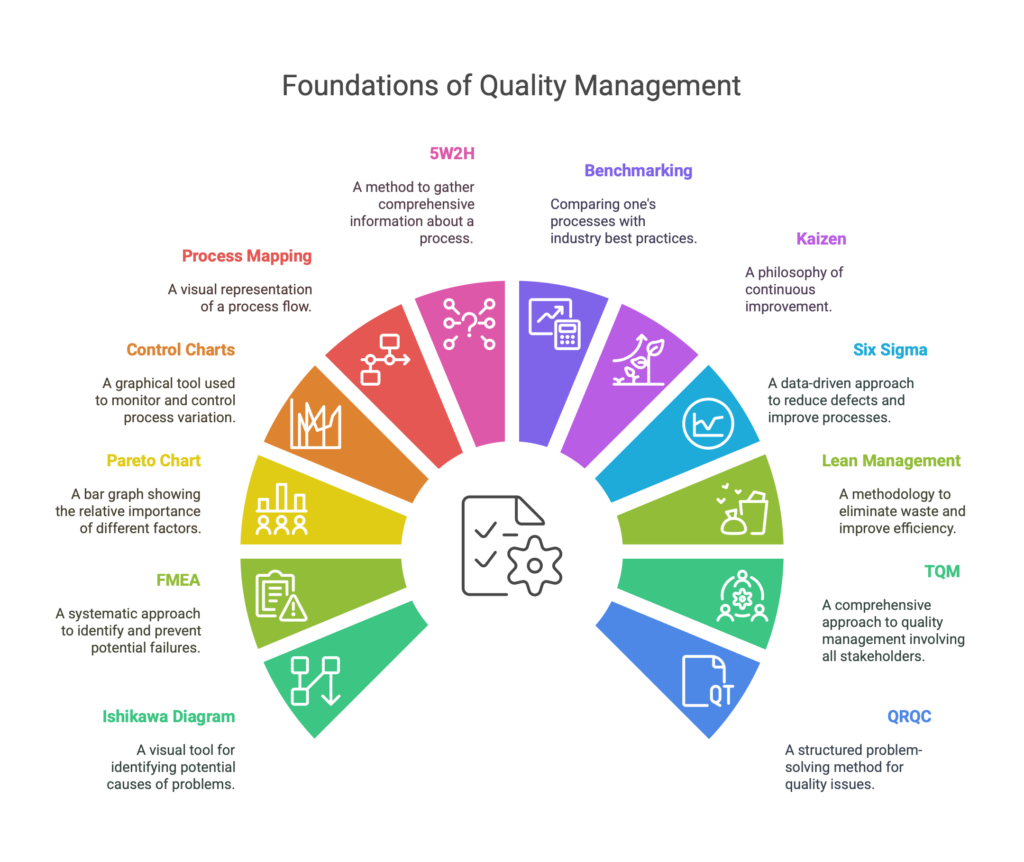Quality management is a set of tools, an approach, and a philosophy that enables the creation and maintenance of systems essential to the entire customer collaboration process – from communication to product delivery and post-sale support (complaints, spare parts).
Properly implemented QM provides assurance that the customer will receive a product of the required standard, with full technical documentation, and in a way that meets expectations.
This approach also guarantees that the company operates in compliance with ISO (or industry-specific) standards and is committed to continuous improvement – meaning it actively seeks ways to optimize processes and reduce costs based on data and research results.
The History and Evolution of Quality Management
Quality management has its roots in the Industrial Revolution, when mass production began to dominate over traditional craftsmanship. A key milestone was the development of quality control methods in the early 20th century, initiated by pioneers such as Walter Shewhart, who introduced the principles of Statistical Process Control (SPC).
In the 1950s and 60s, QM took on a more strategic dimension, particularly in Japan, where the Kaizen philosophy (continuous improvement) and systems such as Total Quality Management (TQM) became widespread. Companies like Toyota implemented Lean Management methodologies, focused on waste elimination and maximizing production efficiency.
Application Examples Across Industries
Automotive
In the automotive sector, QM is absolutely critical. Processes like FMEA (Failure Mode and Effects Analysis) help identify potential issues in design and manufacturing before products reach customers.
Manufacturers such as BMW, Toyota, and Volkswagen use Six Sigma and Lean Management to boost efficiency and reduce errors.
Pharmaceuticals
In the pharmaceutical industry, quality management has a direct impact on patient safety and health. Companies must comply with strict GMP (Good Manufacturing Practice) regulations that govern every stage of production – from lab testing to drug distribution.
Information Technology (IT)
In IT, quality management focuses on ensuring the reliability of systems and applications. Software companies use methodologies like Agile and DevOps to improve development processes and minimize defects.
Common Quality Management Tools
The tools used in quality management include, among others:
-
Ishikawa Diagram
-
FMEA
-
Pareto Chart
-
Control Charts
-
Process Mapping
-
5W2H
-
Benchmarking
-
Kaizen
-
Six Sigma
-
Lean Management
-
Total Quality Management (TQM)

Digital Tools Supporting Quality Management
In addition to traditional tools, many apps and digital platforms now support quality-related tasks by automating and organizing daily work. Examples include:
-
Trello – for visual task management, great for team collaboration
-
ERP Systems – for resource and documentation management, integrating business processes
-
Asana – for project management and coordination across teams
-
Zoom & MS Teams – for remote meetings and streamlined communication
-
Excel, PowerPoint, Word – essential for analysis, reporting, and documentation
These tools are widely used by professionals in quality, engineering, and production departments to enhance operational efficiency and strategic project execution.
The Role of Soft Skills in Quality Management
Although quality management is often associated with data analysis, documentation, and audits, soft skills are becoming increasingly valuable.
An effective quality professional must not only understand standards and tools but also navigate tough conversations with suppliers, encourage shop floor teams to follow procedures, and improve cross-functional communication.
Raising awareness among employees is also key. The person coordinating quality systems must proactively engage various departments and drive a culture of collaboration.
Listening skills, relationship-building, and conflict resolution are now just as important as mastering FMEA or SPC. In a dynamic production environment, product quality matters – but so does the quality of teamwork.
The Impact of Artificial Intelligence (AI) on Quality Management
Since 2023, more manufacturing companies have been exploring the use of artificial intelligence – especially tools based on natural language models like ChatGPT. AI now supports quality engineers in creating SOPs, analyzing customer complaints, and planning corrective actions.
While the potential is huge, it’s important to use these technologies responsibly. For example, AI can still make mistakes in basic math – so applying a “double-check” rule for every output is recommended.
AI does not replace the experience of specialists, but it can serve as a valuable aid – particularly when speed and access to contextual data matter.
In quality management, this can mean faster detection of nonconformities, more efficient audit planning, and smoother implementation of corrective measures.
Author: Klaudia Kwiatkowska-Sarkar


